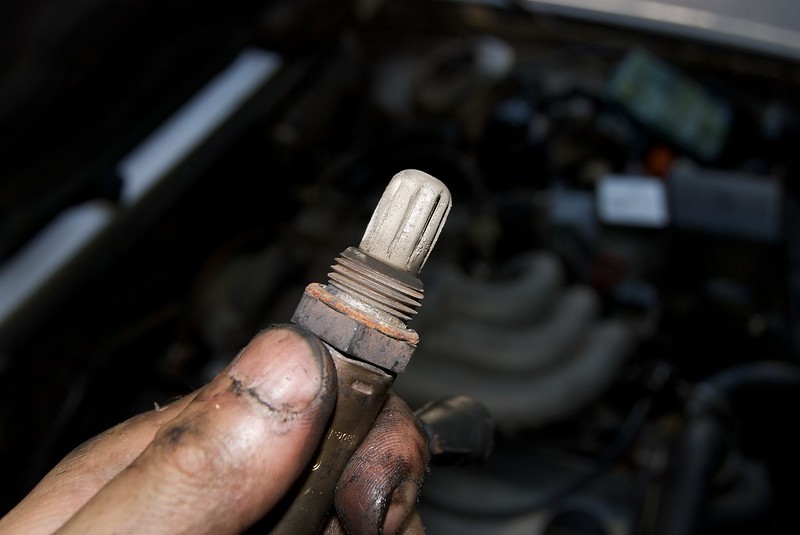If you’re experiencing a loss of power in your car and you’ve recently noticed that your car also has an exhaust leak, then this article is for you
An exhaust leak is caused by damage to your car’s exhaust system, which can be the result of rust or other corrosion or any type of impact that damages the system.
The most common symptom of an exhaust leak is a significant increase in sound, especially when you start your car on a cold morning. However, an increase in exhaust noise might not be the only problem that an exhaust leak can cause.
In this article, we’ll discuss whether an exhaust leak can cause loss of power in your car, as well as some of the other potential problems that it can create.
What Is an Exhaust Leak?
First, let’s quickly review what an exhaust leak is.

An exhaust leak is a crack or hole in your car’s exhaust system that allows exhaust gases to escape. The exhaust system is made up of a series of pipes that carry exhaust gasses from your car’s engine and out through the tailpipe.
Any holes or cracks in this system can allow exhaust gases to escape before they have been properly expelled from your car, reducing the efficiency of your engine and causing a loss of power.
As we mentioned, an exhaust leak is caused by damage to your car’s exhaust system. This damage can be the result of rust or corrosion, dents from an impact with a curb, or other types of damage.
Can an Exhaust Leak Cause Loss of Power?
Yes, an exhaust leak can cause loss of power, but only if the leak is located before the upstream O2 sensor (exhaust manifold, downpipe, flex pipe).

The O2 sensor is a critical component of your car’s engine that monitors the oxygen content of the exhaust gases. Based on this information, the car’s computer can adjust the air-to-fuel ratio in order to achieve maximum efficiency.
If there is an exhaust leak before the O2 sensor, oxygen from the outside will get sucked into the exhaust pipe and will cause the sensor to receive inaccurate information about the oxygen content of the exhaust gases. This, in turn, will falsely tell the ECU that the engine is running lean and the ECU will respond by adding more fuel and richening up the mixture.
Because the ECU has no way of knowing that an exhaust leak is causing false O2 sensor readings, the ECU will add too much fuel and cause loss of power, decreased fuel mileage, and even misfiring if the leak is bad enough.
With that said, an exhaust leak anywhere else after the O2 sensors will not cause any power loss to your car. At worst, it would only make your car sound loud – that’s it.
Keep in mind that an exhaust leak can also cause other problems, even if it’s not located before the O2 sensor. For example, an exhaust leak can cause your car to fail an emissions test, and it can even be dangerous for other drivers if the leak is bad enough.
If you’re experiencing a loss of power in your car and you suspect that it might be due to an exhaust leak, then it’s important that you get your car checked out by a mechanic as soon as possible. They will be able to find and repair the leak, restoring your car’s performance and ensuring that it is safe for you to drive.
How Can You Tell if You Have an Exhaust Leak?
If you’re not sure whether or not you have an exhaust leak, there are a few things that you can look for.
First, check for any visible damage to your car’s exhaust system. This could be a hole, crack, or tear in any of the pipes or connections.
If you can’t see any damage, then listen for any unusual sounds coming from the exhaust system. An exhaust leak will usually cause a hissing or whistling noise, and it may also cause a rattling or a louder exhaust than usual.
An exhaust leak that is close to the engine, say a cracked exhaust manifold or a blown manifold gasket, will produce a loud and quite sharp ticking noise. This noise is very similar to the sound of valves ticking and is quite often mistaken for that.
If you can’t hear the exhaust leak, you can try asking a friend to plug the end of the exhaust pipe with a rag – don’t worry, this will not cause any damage to your engine. By doing that, you will force most exhaust gases to flow through the exhaust leak and thus produce much more sound.
But if listening for an exhaust leak does not sound like a good idea to you, you can try spraying soapy water around the exhaust system and looking for bubbles, especially around areas where you might expect the leak to be. In most cases, it’s around the exhaust manifold, the flex pipe, mid pipe, or the muffler.
However, make sure that your car’s exhaust system is completely cold, otherwise, the soapy water will just evaporate in seconds.
Can an Exhaust Leak Cause Poor Acceleration?
Yes, an exhaust leak can cause poor acceleration in your car, but only if the leak is located before the O2 sensor. If the leak is located anywhere else after the O2 sensor, it will not cause any loss of power or poor acceleration.
As we’ve mentioned before, an exhaust leak before the O2 sensor can cause the ECU to add too much fuel to the Air-to-Fuel mixture and thus cause loss of power and poor acceleration.
Exhaust Leak Repair Cost
If you’d rather leave fixing the exhaust leak to a professional mechanic, then I won’t blame you – exhaust repair is a lot of work and often requires a welder.
With that said, here is an estimation of different exhaust leak repairs. Keep in mind that it’s just an estimation and the real cost is different depending on the state you live in and the muffler shop.
- Exhaust Manifold Gasket Replacement – $110 up to $330
- Exhaust Manifold Replacement – $260 up to $500
- Broken Exhaust Bolt Extraction – $250 up to $800
- Exhaust Flex Pipe Replacement – $50 up to $250
- Catback Exhaust Replacement – $140 up to $500
- Catalytic Converter Replacement – $300 up to $1500
- Exhaust Pipe Welding – $25 up to $100
- Whole Exhaust Pipe Replacement – $400 up to $1500
Final Thoughts
An exhaust leak can be quite an annoying problem, and it’s important to get it fixed as soon as possible.
Not only will it cause your car to lose power, but it can also be dangerous as it might allow deadly carbon monoxide gases into the cabin.
Because of that, it’s always a good idea to get exhaust leaks fixed ASAP, and the best way to do that is by taking your car to a professional mechanic.
Of course, you can try fixing it yourself, but unless you’re experienced with car repairs, I would not recommend it.

Eddie is the co-founder of CarCareCamp.com, and the site’s primary contributor.
Under his belt, Eddie has a bachelor’s degree in Automotive Electronics Engineering and almost a decade of experience working as a semi-truck technician (specializing in electrics).
